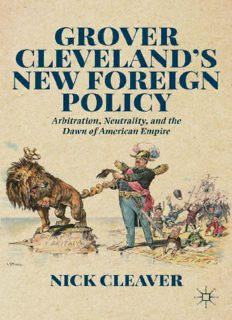
Grover Cleveland's New Foreign Policy: Arbitration, Neutrality, and the Dawn of American Empire PDF
Preview Grover Cleveland's New Foreign Policy: Arbitration, Neutrality, and the Dawn of American Empire
Grover Cleveland’s New Foreign Policy This page intentionally left blank Grover Cleveland’s New Foreign Policy Arbitration, Neutrality, and the Dawn of American Empire Nick Cleaver grover cleveland’s new foreign policy Copyright © Nick Cleaver, 2014 All rights reserved. First published in 2014 by PALGRAVE MACMILLAN® in the United States—a division of St. Martin’s Press LLC, 175 Fifth Avenue, New York, NY 10010. Where this book is distributed in the UK, Europe and the rest of the world, this is by Palgrave Macmillan, a division of Macmillan Publishers Limited, registered in England, company number 785998, of Houndmills, Basingstoke, Hampshire RG21 6XS. Palgrave Macmillan is the global academic imprint of the above companies and has companies and representatives throughout the world. Palgrave® and Macmillan® are registered trademarks in the United States, the United Kingdom, Europe and other countries. ISBN: 978-1-137-44847-7 Library of Congress Cataloging-in-Publication Data Cleaver, Nick. Grover Cleveland’s new foreign policy : arbitration, neutrality, and the dawn of American empire / by Nick Cleaver. pages cm Includes bibliographical references and index. ISBN 978-1-137-44847-7 (hardback : alk. paper) 1. United States—Foreign relations—1865-1898. 2. Cleveland, Grover, 1837-1908. I. Title. E706.C59 2014 327.73009′034—dc23 2014018527 A catalogue record of the book is available from the British Library. Design by Amnet. First edition: October 2014 10 9 8 7 6 5 4 3 2 1 To my parents This page intentionally left blank Contents Acknowledgments ix Introduction 1 1 The Hawaiian Revolution, 1893 25 2 Walter Q. Gresham, 1893–1895 63 3 Nicaragua, Venezuela, and the Monroe Doctrine 99 4 The Cuban War of Independence 147 Conclusion 197 Notes 213 Bibliography 243 Index 251 This page intentionally left blank Acknowledgments This book would not have been possible without the help of a great many people. I am particularly indebted to my PhD supervisors, Rich- ard Crockatt and John Charmley, who guided me through a large part of the process of researching and writing and provided constant encouragement and astute insight. I must also thank the librarians, archivists, and staff at the Manu- script Division of the Library of Congress, the British Library, and the University of East Anglia Library, who facilitated much of the research behind this book. I am indebted to everyone who read all or part of the manuscript in its various forms over the last six years. This includes Andrew Preston, Thomas Otte, Catherine Barter, and the anonymous reviewers; their feedback and suggestions on how to clarify my argument and improve the quality of my writing were gratefully received. The research for this book was made possible by bursaries from the School of American Studies and the Arthur Miller Centre, both at the University of East Anglia. Beyond this financial support I would like to thank my friends and colleagues within the school, some of whom have now moved on to pastures new, for their advice and guidance throughout. Finally, I have depended throughout this process on the support and encouragement of many friends and relatives. My parents, Rich- ard and Janet Cleaver, have been the source of unceasing emotional, intellectual, and financial support, and my sister, Laura Cleaver, has provided both sound advice and a sympathetic ear. I am deeply grate- ful to them and to all the friends and colleagues who have helped make this book possible.
Description: